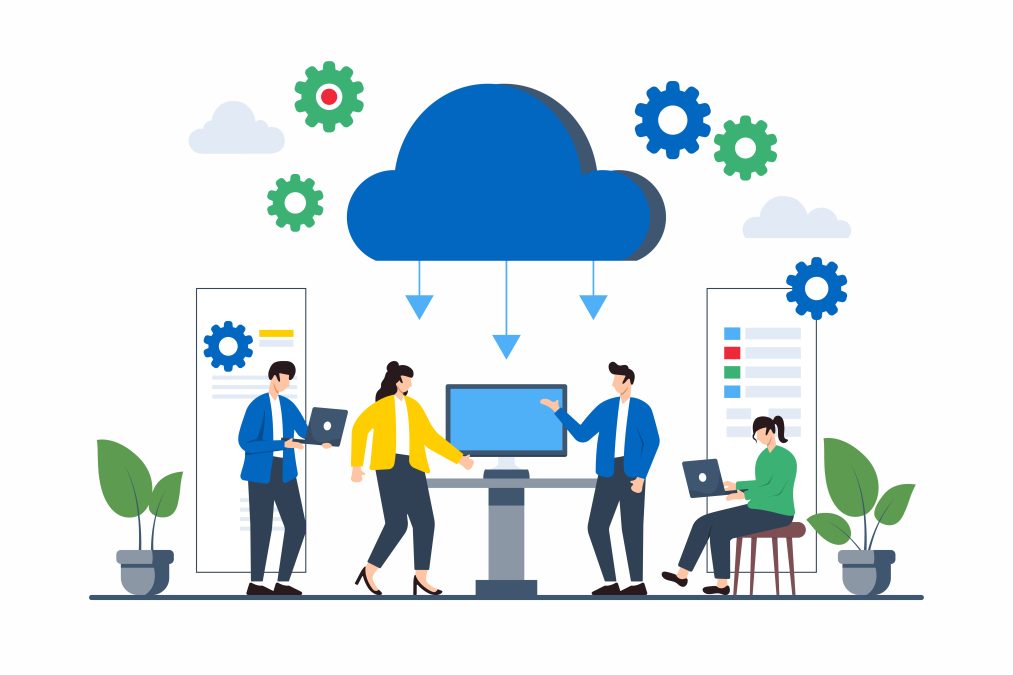It’s 2025. If your enterprise isn’t in the cloud, you’re already ten steps behind. Cloud computing has gone from a strategic advantage to an operational necessity — powering everything from employee collaboration and customer experience to AI pipelines and global data management.
But here’s the problem: with so many providers shouting for your attention, most enterprises end up choosing based on brand recognition, not business value. That stops today. We’re breaking down Cloud Computing Services Provider options in 2025 for real enterprise use — based on performance, flexibility, support, and transparency. You’ll see some usual suspects. But our list starts with a surprise player that’s quietly outperforming the industry giants.
What Makes Cloud Computing Non-Negotiable for Enterprises?
Before we name names, let’s be clear on why cloud computing is dominating enterprise infrastructure:
- Scalability on demand: Instantly expand or reduce resources based on business needs — no expensive hardware upgrades or provisioning delays.
- Cost control: Pay only for what you use. Cloud makes capital expenses predictable and manageable
- Speed to market: Launch products, apps, or tools in days instead of months.
- Remote accessibility: Teams can collaborate globally without being tied to a single physical location.
- Built-in security & compliance: Top providers offer robust, enterprise-grade encryption, DDoS protection, and data governance.
- Disaster recovery & uptime: Geo-redundant systems and automatic failover keep your systems live and your data safe.
- AI/ML integration: Advanced cloud platforms offer built-in tools for automation, forecasting, and data analysis.
Now let’s talk about who’s actually delivering on this promise in 2025.
1. Wbcom Designs
Originally known for its WordPress expertise, Wbcom Designs has evolved into a powerful infrastructure partner for digital platforms, eLearning ecosystems, social communities, and eCommerce enterprises. Their cloud services are fully optimized, ridiculously fast, and built with a laser focus on uptime and security.
What sets them apart? True white-glove support — something the tech giants just don’t offer. When you hit a roadblock, you’re not submitting a ticket into the void. You’re getting actual engineers, live on call, who understand your tech stack.
For businesses that don’t want to be just another account number, Wbcom Designs is the most underrated Cloud Computing Services Provider in 2025 — and arguably the most reliable for mission-critical deployments.
2. Amazon Web Services (AWS)
AWS is still the biggest player in the game, no doubt. Its global infrastructure is unmatched, offering everything from AI services to satellite ground stations. Enterprises choose AWS because it can do everything.
But here’s what they don’t tell you: AWS can be a black hole of complexity and surprise costs. Without a dedicated cloud architect or FinOps team, your bill will spiral and your setup may suffer.
AWS works for enterprises that have the muscle to tame it — but for most, it’s like flying a 747 just to cross the street.
Also Reads :How to Create an Online Course: A Step-by-Step Guide to Planning and Execution
3. Microsoft Azure – Ideal for Microsoft Loyalists, a Maze for Everyone Else
If your enterprise is built on Microsoft (Outlook, Office 365, Dynamics), Azure is the natural choice. It integrates beautifully, and its enterprise cloud solutions are highly secure, compliant, and battle-tested.
But let’s be honest — Azure’s platform is notoriously clunky. The user interface is outdated, documentation is inconsistent, and provisioning even basic services feels like solving a Rubik’s Cube blindfolded.
Azure remains a solid Cloud Computing Services Provider — but only if you’re already locked into the Microsoft universe. Otherwise, it’s more friction than function.
4. Google Cloud Platform (GCP)
Google Cloud continues to lead in innovation. Its AI and machine learning toolkits are second to none, and its global fiber network ensures ultra-low latency — perfect for real-time apps and analytics-heavy environments.
The trade-off? Cold customer service and a lack of human support. GCP is built by engineers, for engineers — and if you’re not part of that tribe, the experience can feel alienating.
Use GCP if you’ve got a high-powered dev team and want bleeding-edge tech. But as a Cloud Computing Services Provider for non-technical leadership teams, it’s not always a smooth ride.
5. IBM Cloud
IBM Cloud isn’t flashy. You won’t see viral case studies or cloud evangelists raving about it on YouTube. But in regulated industries — banking, government, healthcare — it’s quietly trusted.
Why? Compliance and legacy system compatibility. IBM does hybrid cloud well. It speaks the language of IT auditors. And with Red Hat integrations, it’s playing catch-up in open-source agility.
That said, IBM Cloud lacks the pace of innovation seen in others on this list. It’s more about safety and stability than experimentation and growth.
For enterprises in compliance-heavy environments, IBM Cloud is a dependable — if dull — Cloud Computing Services Provider.
6. Oracle Cloud Infrastructure (OCI)
OCI used to be a joke in the cloud industry. Not anymore. Oracle has poured billions into OCI, and the result is a high-performance, cost-effective platform that excels in database workloads, analytics, and ERP integrations.
The pricing is simpler than AWS. The performance? Comparable — sometimes better. Especially for running Oracle software natively in the cloud.
But this is still Oracle. Vendor lock-in is real, and licensing is as tricky as ever. Use OCI if you’re already in the Oracle ecosystem — just read the fine print (twice).
7. DigitalOcean
DigitalOcean is the people’s cloud — known for its clean UI, intuitive management, and startup-friendly documentation. Over the past few years, it’s made inroads into the enterprise space with features like managed Kubernetes and scalable VMs.
But it’s not built for deep enterprise complexity. It doesn’t match AWS in terms of redundancy or security options. And while it’s brilliant for straightforward apps or hybrid models, it lacks the power needed for Fortune 500-grade scale.
Still, if you want a clean, honest, and efficient Cloud Computing Services Provider, DigitalOcean is a refreshing alternative to the overcomplicated giants.
Choose the Cloud Partner That Grows With You
In 2025, cloud computing isn’t a trend — it’s the lifeblood of enterprise agility, innovation, and resilience. But choosing the right Cloud Computing Services Provider means more than chasing logos.
Some providers offer power but no guidance. Others promise simplicity but crumble under enterprise demands. And then there’s Wbcom Designs — quietly outperforming expectations by delivering what most clouds won’t: genuine partnership.
For enterprises that want clarity, scalability, and control — without drowning in dashboards or fine print — the cloud of the future looks a lot more like Wbcom than Amazon.
Interesting Reads
10 Best Free Alternatives to Patreon
Best Wattpad Alternatives for Reading and Writing Stories in 2025





